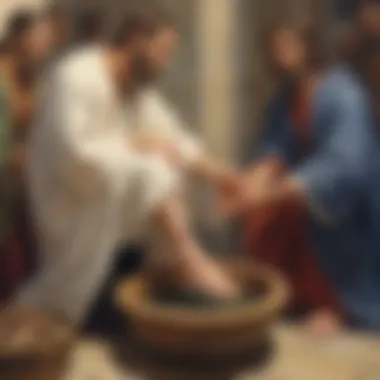Unveiling the Profound Significance of Easter Week Religious Observances


Interactive Learning Games
As we delve into the intricate tapestry of Easter Week Religious Days, it is crucial to understand the significance each holds in Christian faith. From the solemn observance of Maundy Thursday to the profound reflection of Good Friday, these days are steeped in symbolism and tradition.
Educational Topics
It is essential to explore the religious significance of Maundy Thursday, a day commemorating the Last Supper of Jesus Christ. This solemn occasion marks the beginning of the Easter Triduum, leading up to Easter Sunday, and holds deep meaning in the Christian faith.
In the same vein, Good Friday stands as a pivotal day in the Easter narrative, marking the crucifixion of Jesus Christ. This day invites believers to reflect on sacrifice, redemption, and the profound love demonstrated through Christ's ultimate act of selflessness.
Conversely, Holy Saturday serves as a period of contemplation and anticipation, symbolizing the time between Christ's crucifixion and resurrection. This somber day prompts believers to reflect on hope, faith, and the promise of new beginnings.
Finally, Easter Sunday heralds the celebration of Christ's resurrection, symbolizing triumph over death and sin. This joyous day encapsulates the essence of the Christian faith, embracing themes of renewal, rebirth, and eternal life.
The sacred journey through Easter Week Religious Days offers believers a profound opportunity for introspection, reverence, and spiritual growth, enriching their connection to the core tenets of Christianity.
Introduction
Easter Week, a period of deep religious significance for Christians worldwide, offers a time of reflection and spiritual growth. This article aims to shed light on the profound meaning behind each religious day within Easter Week, delving into their rich symbolism and importance in Christian traditions. From Maundy Thursday to Easter Sunday, these days hold unique significance that adds depth to the faith of believers and provides a roadmap for understanding the core tenets of Christianity.


Understanding Easter Week
Easter Week encompasses a series of religious observances leading up to the celebration of Jesus Christ's resurrection. Specifically, 'Overview of the Holy Week' focuses on the chronology of events leading to Easter, including Palm Sunday, Maundy Thursday, Good Friday, and Holy Saturday, culminating in Easter Sunday. This overview serves as a thematic guide for believers to immerse themselves in the journey towards the resurrection, emphasizing the significance of each day in the life and teachings of Jesus Christ. The 'Importance of Easter in Christian faith' section delves into the foundational significance of Easter within Christian doctrine. It elucidates how the resurrection of Jesus Christ symbolizes hope, redemption, and eternal life for believers, underpinning the core beliefs of Christianity. By exploring the theological underpinnings of Easter, this section provides a comprehensive understanding of why Easter holds unparalleled importance in the Christian faith, shaping believers' perspectives on life, death, and salvation.
Maundy Thursday
Maundy Thursday holds a critical place within the Easter Week religious observances. This day commemorates the Last Supper of Jesus Christ with his disciples before his crucifixion. The term 'Maundy' originates from the Latin word 'mandatum,' meaning commandment, referencing Jesus' command to love one another as he loved them. The solemnity of Maundy Thursday sets the tone for the upcoming days of Easter Week, emphasizing themes of sacrifice, redemption, and humility. Christians worldwide mark this day with reverence and reflection, honoring the profound significance of Jesus' final teachings.
Origin and Significance
Last Supper and Jesus' teachings
One of the pivotal elements of Maundy Thursday is the Last Supper, where Jesus shared bread and wine with his disciples, symbolizing his body and blood. This symbolic meal not only signifies the upcoming sacrifice of Jesus on the cross but also underscores the importance of communion and spiritual nourishment. Jesus' teachings during this final meal encompassed themes of love, service, and forgiveness, urging his followers to emulate his example of humility and selflessness. The Last Supper serves as a poignant reminder of Jesus' ultimate act of love and devotion towards humanity, inspiring Christians to live out these principles in their daily lives.
Traditions and customs observed
On Maundy Thursday, various traditions and customs are practiced by Christian communities worldwide. One common custom is the ceremonial washing of feet, symbolizing humility and service, mirroring Jesus' act of washing his disciples' feet during the Last Supper. This act of humility reinforces the importance of serving others with compassion and selflessness. Additionally, churches may hold solemn liturgies, including the stripping of altars to symbolize Jesus' imminent suffering and death. The somber atmosphere of Maundy Thursday encourages contemplation and self-examination, inviting believers to deepen their faith and reflect on the profound sacrifice of Jesus.
Good Friday


Good Friday holds a pivotal place in the Easter Week religious observances, symbolizing the solemn remembrance of Jesus Christ's crucifixion. This day serves as a somber reflection on the immense sacrifice Jesus made for humanity according to Christian beliefs. The significance of Good Friday lies not only in the historical event of the crucifixion itself but also in the profound theological implications it carries. It represents a cornerstone of faith and a demonstration of divine love and redemption. The rituals and practices observed on Good Friday vary across Christian denominations but usually involve fasting, prayer, attending church services, and contemplating the suffering of Christ on the cross, instilling a deep sense of gratitude and humility.
Crucifixion and Mourning
Symbolism of Jesus' Sacrifice
The symbolism of Jesus' sacrifice on Good Friday is deeply poignant, representing the pinnacle of selflessness and love in Christian doctrine. The act of Jesus willingly laying down his life to atone for the sins of humanity epitomizes the concept of salvation and grace. The crucifixion is regarded as the ultimate manifestation of God's unconditional love and mercy towards mankind. It underscores the central tenet of Christian faith - the belief in Jesus as the savior who offers eternal salvation through his sacrifice. This symbolism serves as a focal point of reflection and reverence, encouraging believers to contemplate the depth of God's love and the magnitude of Christ's sacrifice for humanity's redemption.
Religious Practices and Commemorations
The religious practices and commemorations associated with Good Friday are characterized by a sense of solemnity and reverence. Various rituals such as the Stations of the Cross, veneration of the cross, and Passion plays are commonly performed on this day to reenact and meditate on the events leading to Jesus' crucifixion. Fasting and abstinence from meat are prevalent customs observed by believers as a sign of penance and spiritual discipline. Church services often incorporate readings of the Passion narrative from the Gospels and hymns that convey themes of sacrifice and redemption. These practices aim to deepen the faithful's connection to the profound significance of Good Friday and evoke contemplation on the intense suffering endured by Jesus for the sake of humanity's salvation.
Holy Saturday
With its unique position in the Easter Week timeline, Holy Saturday offers a moment of solemnity and contemplation. It serves as a bridge between the sorrowful events of Good Friday and the exultant celebration of Easter Sunday. This day holds particular significance for Christians as they ponder the mystery of Christ's descent into hell and the victory over death that is to come with his resurrection.
Holy Saturday provides an opportunity for believers to meditate on the core tenets of their faith. It encourages introspection and spiritual preparation for the joyous culmination of Easter Sunday. As individuals navigate through this period of waiting and reflection, they deepen their understanding of the redemptive power of Christ's sacrifice and the hope of salvation that his resurrection promises.
The observance of Holy Saturday is marked by various rituals and customs that contribute to the somber yet expectant atmosphere of the day. From special church services to moments of silent prayer and contemplation, believers engage in practices that honor the significance of this pivotal moment in the Easter story. Through these traditions, Christians reaffirm their faith and dedication to following the path laid out by Jesus, reconnecting with the foundational teachings of their religion.


As believers immerse themselves in the rituals and customs of Holy Saturday, they embody the essence of anticipation and faith that define this day. The observance of traditions such as participating in liturgical services, lighting candles, and engaging in acts of penance helps individuals cultivate a sense of reverence and commitment to their spiritual journey. These practices deepen their connection to the core elements of the Easter narrative, fostering a profound sense of spiritual fulfillment and unity within the Christian community.
Easter Sunday holds immense importance in the culmination of the Holy Week, symbolizing the pinnacle of Christian faith and beliefs. This special day marks the celebration of Jesus Christ's resurrection from the dead, signifying victory over sin and death. Christians worldwide commemorate this event with profound reverence and jubilation. The resurrection of Jesus on Easter Sunday underscores the central tenet of Christianity, offering believers hope, redemption, and the promise of eternal life. The significance of Easter Sunday lies in its capacity to inspire faith, renewal, and spiritual rejuvenation among the faithful, emphasizing the core principles of salvation and divine grace.
Celebrating the Resurrection
Significance of Jesus' Resurrection:
The significance of Jesus' resurrection embodies the core essence of Christian faith, representing the fundamental belief in the triumph of life over death. This pivotal event serves as the foundational basis for Christian theology, establishing Jesus as the divine Messiah and savior of humanity. The resurrection demonstrates God's power over mortality and foreshadows the concept of resurrection and eternal life for believers. Understanding the significance of Jesus' resurrection illuminates the profound implications of redemption, forgiveness, and eternal salvation within Christian doctrine. This aspect of Easter Sunday underscores the transformative power of faith and the enduring legacy of Christ's sacrifice for humanity.
Joyful Festivities and Religious Ceremonies:
The joyful festivities and religious ceremonies associated with Easter Sunday embody centuries-old traditions and cultural practices that highlight the exuberant spirit of the occasion. From Easter egg decorating to lively church services and communal gatherings, the day is marked by a jubilant atmosphere of celebration and thanksgiving. Joyful music, vibrant decorations, and traditional meals characterize the festive merriment of Easter Sunday, fostering a sense of communal unity and spiritual renewal. Participating in religious processions, hymns, and prayers during this time reinforces the shared values of faith, hope, and unity among believers, creating a harmonious bond within the faith community.
Conclusion
In encapsulation, the importance of the Conclusion within this article is paramount. At the termination of a detailed exploration into the significance of Easter Week Religious Days, the Conclusion serves as the pinnacle of reflection and synthesis. It acts as the focal point where all the intricate details discussed throughout the article harmonize to convey a cohesive and profound message. The Conclusion not only offers closure to the narrative but also prompts readers to contemplate the enduring impact of the religious days and the enduring relevance of faith traditions in Christian observances. It serves as a guidepost, directing readers towards the deeper meanings encapsulated within each day of Easter Week.
Reflecting on the Easter Week
Impact of the religious days
The Impact of the religious days holds a distinguished position within the fabric of this article, enriching the narrative with layers of significance and depth. Each religious day within Easter Week delineates a distinct aspect of Christian faith and ideology, contributing to the intricate tapestry of beliefs. The Impact of the religious days reverberates with solemnity, guiding adherents through a spiritual journey of reflection, repentance, and renewal. Its salient feature lies in fostering a connection to the fundamental tenets of Christianity, reminding believers of the ultimate sacrifice and redemption symbolized by Jesus' crucifixion and resurrection. This facet of the religious days resonates as a cornerstone of faith, embodying the essence of devotion and resilience amidst challenges. The Impact of the religious days emerges as a fulcrum in shaping spiritual consciousness and fostering a sense of community among worshippers, underscoring the enduring relevance of Easter Week in Christian worship.
Continuation of faith traditions
Delving into the Continuation of faith traditions illuminates a pathway towards perpetuating the legacy of Christian observances across generations. The Continuation of faith traditions symbolizes the seamless thread that connects past, present, and future, ensuring the perpetual commemoration of religious practices and beliefs. Its pivotal characteristic lies in imparting a sense of heritage and continuity, nurturing a sacred kinship with ancestral roots and theological doctrines. This facet of faith traditions pervades the essence of religious rituals, rituals, embodying a resolute commitment to upholding customs and teachings passed down through centuries. The Continuation of faith traditions serves as a beacon of solidarity among believers, fostering a collective reverence for the timeless wisdom enshrined in Easter Week observances. Its unique feature resonates with a spiritual legacy that transcends temporal boundaries, reaffirming the enduring sanctity of faith in the face of modernity and change. As an integral part of this article, the Continuation of faith traditions accentuates the enduring relevance and timeless significance of Easter Week in perpetuating spiritual values and communal bonds.















